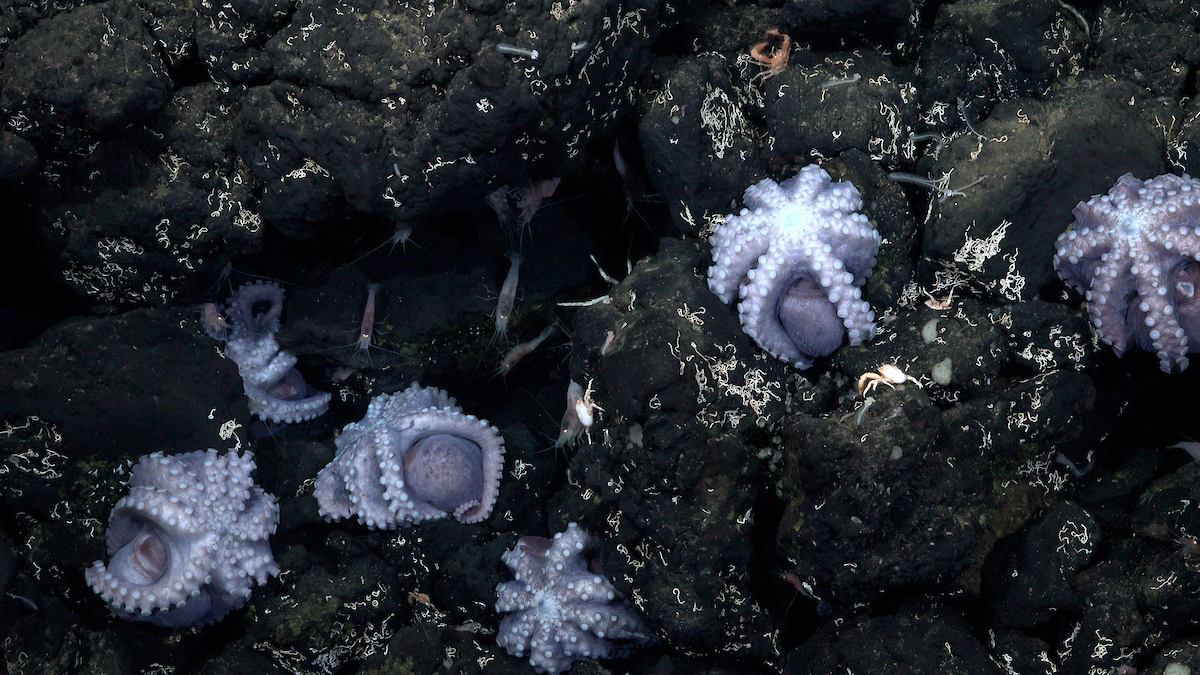Deep off the coast of Costa Rica, scientists have discovered a nursery teeming with octopuses. Most incredibly, the team even managed to catch a glimpse of the babies hatching from their eggs, showing this part of the deep sea is an active nursery.
The octopus garden was discovered at a low-temperature hydrothermal vent offshore of Costa Rica at a depth of around 2,800 meters (9,186 feet) in a patch known as the Dorado Outcrop.
Researchers from the Schmidt Ocean Institute, University of Costa Rica, and Bigelow Laboratory for Ocean Sciences scoped out the site from the research vessel Falkor (too) using their underwater robot, ROV SuBastian.
The newly discovered octo-nursery.
Image credit: Schmidt Ocean Institute
The Dorado Outcrop nursery was first explored in 2013 when scientists made the first-ever observation of female octopus gathering together to brood their eggs.
However, this is the first time they’ve seen the eggs hatching here, proving that the Dorado Outcrop can support young octopuses from birth. It also affirms the theory that some species of deep-sea octopus head to low-temperature hydrothermal vents for brooding their eggs.
It’s not certain yet, but the team believe the octopus is potentially a new species of Muusoctopus, a genus of small to medium-sized octopus which lack an ink sac.
As you can see in the live stream of the expedition, octopuses weren’t the only creatures the researchers stumbled across. Their project documented hundreds of animals, many of which may be new species.
“The discovery of a new active octopus nursery over 2,800 meters [9,186 feet] beneath the sea surface in Costa Rican waters proves there is still so much to learn about our Ocean,” Dr Jyotika Virmani, Schmidt Ocean Institute Executive Director, said in a statement.
“The deep-sea off Costa Rica rides the edge of human imagination, with spectacular footage collected by ROV SuBastian of tripod fish, octopus hatchlings, and coral gardens. We look forward to continuing to help the world witness and study the wonders of our incredible Ocean,” continued Virmani.
“This expedition to the Pacific deep waters of Costa Rica has been a superb opportunity for us to get to know our own country. The expedition had a significant number of local scientists and students which will accelerate our capacity to study deep regions. The information, samples, and images are important to Costa Rica to show its richness and will be used for scientific studies, and outreach to raise awareness of what we have and why we should protect it,” said Dr Jorge Cortes of the University of Costa Rica.
This is just the beginning of the Schmidt Ocean Institute’s mission to explore the world’s oceans. Starting with an exploration of the North Atlantic in 2023, they plan to launch missions to all seven continents over the next decade. Along with mapping the seafloor, they hope to uncover never-before-seen biodiversity and assess how the oceans are faring against the threat of climate change.
Source Link: Deep-Sea Baby Octopus Nursery Seen In Stunning Footage From Costa Rica
